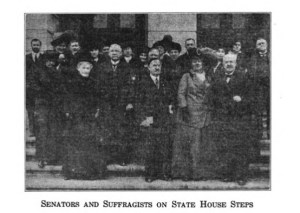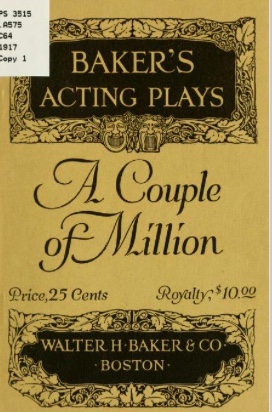True to its name, the NEWPORT COUNTY Woman Suffrage League (NCWSL) began to quickly branch out county wide from its Bristol Ferry roots. Founded with eight members in 1907, by 1909 there were seventeen members. One of the 1909 officers, Mary Osborn, was from Tiverton. Cora Mitchel and Veva Storrs went to the Kingston state fair to promote the suffrage cause. NCWSL was active in giving lectures and socials. The group hosted the Rhode Island Woman Suffrage Association and there were sixty people present. By 1910 membership was up to thirty-three members.
There was a critical shift in 1912 once Maude Howe Elliott became the President. Cora Mitchel stepped into the Vice President role. In 1913 there were ninety members and they were from Portsmouth, Middletown, Newport and Tiverton. Newport, Middletown and Tiverton meetings began. Julia Ward Howe had died in 1910 and her daughter Maude Howe Elliott moved into the Oak Glen home on Union Street. Meetings were conducted there, but they were also held at the Channing Parlors in Newport and at the summer residence of socialite Mrs. Katherine McCormick. The League keeps its contact with the Rhode Island Suffrage League in Providence.
The Middletown Suffragists
Mary Clark Sturtevant (1843-1931) and daughters Mary, Helena and Alice Sturtevant Howard
Mrs. Eugene Sturtevant (Mary) was a prime founder of St. Columba’s (the Berkeley Memorial Chapel). Mary was the daughter of Thomas Clark – Episcopal Bishop of RI. She and her husband donated the land. Eugene Sturtevant was a real estate developer and he bought up large parcels of land on the eastern shore of Middletown and sold the lots.
Mary was a local historian and she researched, wrote and spoke about the history of the East Side of Middletown. She had been a Middletown resident since 1871. Mary was an active member of the Art Association and would have worked with Maud Howe Elliott there. She worked for the preservation of Whitehall, the Middletown home of Bishop Berkeley. She was an advocate of child welfare causes and was on the board of St. Mary’s Home for Children in Providence.
 Mary Sturtevant was active in the suffrage cause. In The History of Woman Suffrage it states that “In Middletown the [Newport County Woman Suffrage] league’s work was ably carried on by Mrs. Eugene Sturtevant and her daughters.” In November 1914, Mary Sturtevant was named Vice President of the Newport County Woman’s Suffrage League. Her daughter Mary was named treasurer. In February 1915, Mary Clark Sturtevant was the Newport representative on the Rhode Island State Committee of Woman Suffrage. She also was a member of the Congressional Union, the offset of the National American Women’s Suffrage Association (NAWSA), in Rhode Island in 1915. In a newspaper article “Woman Suffragists Invade State House” Cora Mitchel, Maud Howe Elliott and Mrs. Sturtevant “buttonholed” (detained them in conversation against their will) state senators and representatives. They had pictures taken with the statesmen. She was a speaker before NCWSL at Oak Glen 1913. When the suffragists entertained the troops as war service, Mary would play the organ. She wrote a booklet countering the arguments of the Anti-Suffrage speakers.
Mary Sturtevant was active in the suffrage cause. In The History of Woman Suffrage it states that “In Middletown the [Newport County Woman Suffrage] league’s work was ably carried on by Mrs. Eugene Sturtevant and her daughters.” In November 1914, Mary Sturtevant was named Vice President of the Newport County Woman’s Suffrage League. Her daughter Mary was named treasurer. In February 1915, Mary Clark Sturtevant was the Newport representative on the Rhode Island State Committee of Woman Suffrage. She also was a member of the Congressional Union, the offset of the National American Women’s Suffrage Association (NAWSA), in Rhode Island in 1915. In a newspaper article “Woman Suffragists Invade State House” Cora Mitchel, Maud Howe Elliott and Mrs. Sturtevant “buttonholed” (detained them in conversation against their will) state senators and representatives. They had pictures taken with the statesmen. She was a speaker before NCWSL at Oak Glen 1913. When the suffragists entertained the troops as war service, Mary would play the organ. She wrote a booklet countering the arguments of the Anti-Suffrage speakers.
Lila Pierce Peckham 1864-1948 (Mrs. Elisha Peckham) hosted meetings at her Middletown home, “Seven Pines”. A Newport Mercury account of a meeting there in 1914 tells of a “Preparation Day” meeting for a national woman Suffrage demonstration. Lila’s daughter, Elizabeth A. Peckham presented readings for “The Woman’s Journal.” Interestingly, the meeting was presided by a man – R. Wallace Peckham.
Lila Peckham (1864-1948) was a newspaper reporter and was noted for club work, especially the Oliphant Reading Club. She was a member of the Middletown School Committee.




